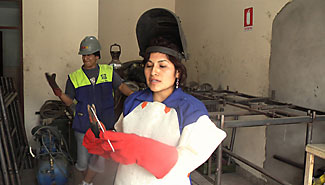
(above) Women's work: Maria Landa (r.) runs a bustling welding business on the outskirts of Lima, Peru with her sister Elvira. (Photo: Sara Miller Llana)
In Peru, women welders forge ahead
Augist 1, 2008 - Christian Science Monitor
Two sisters in Lima win acclaim for breaking stereotypes – and teaching women business skills.
By Sara Miller Llana | Staff writer of The Christian Science Monitor
Lima, Peru - Villa El Salvador, a sprawling district that was once a patch of desert on the fringe of Peru's capital, Lima, is not the kind of place where stereotypes are typically tested.
But when it came time to choose a career, Maria Landa – whose parents peddled everything from shoe insoles to gum along the dusty streets here – said she wanted to be a welder.
More than 10 years later, Maria and her sister Elvira run a bustling welding business. A year ago, when an earthquake rocked Peru, killing more than 500 people and leaving tens of thousands homeless, the two were called upon to build temporary homes and schools for the displaced, constructing frames for some 1,000 tents that people are still living in today.
"Here we were, two women being chosen to do such important work," says Maria, the founder of Santa Maria Events and Industries. "It was an honor."
Today, she says, they still deal with stereotypes in a business dominated by men. But, having won a slew of awards in Peru and the US for her entrepreneurial prowess, she is helping to change attitudes in her community and beyond. Maria and her sister help other young entrepreneurs to gain a foothold in the small business world, the backbone of Peru's economy. And, at least in this small corner of Lima, they have become an inspiration for others.
"We always hold the two of them up as an example here," says Oscar Cardenas Guzman, who works for Villa El Salvador's municipal business development office. " 'If they can do it,' we say, 'you can too. It is a matter of finding the strength within yourself.' "
Consecutive years of hyperinflation and financial crisis throughout the 1980s created fertile ground for microenterprise in Peru, says Eduardo Moron, an economist at Pacific University in Lima. Now there are 2.5 million small and micro-firms like Santa Maria Events and Industries, comprising up to 97 percent of all businesses in Peru.
Women's role in Peru's microcredit boom
Today, access to microcredit has grown alongside the economy, which has boomed with record mineral prices. And women have played an important part of that growth. "When you invest in women you get more for your dollar in terms of impact," says Milo Stanojevich, country director for CARE Peru, the global humanitarian organization that gave the Landas their start with training and business advice. "Women tend to invest resources on education, health, food.... Men will say 'we need a road.' "
But few women have pushed outside gender confines as the Landas have. The sisters didn't set out to confront conventions. They attended an all-girls Catholic school where the nuns taught them everything from music to mechanics. When their 1970s-era car broke down, the nuns fixed it themselves. When they needed new wiring, they asked the priests how to install it.
"Women should know how to do everything," says Sabina Marroquin, the director of the Santa Rosa de Lima school who taught Maria and Elvira when they were young. It is a lesson they still impart today: When the school needed new window bars, it called the Landas.
Raised without limits
The sisters say their parents never distinguished between genders. "Our parents taught us that the only difference is the effort you put into something," says Elvira. Their mother, Rosa Elvira Chiroque, constantly scoured for opportunities. One day she found a CARE pamphlet offering training for welding.
They went on to study plane engine welding and to work in auto mechanic shops. But eventually Maria decided to start a business, which began in her parents' garage.
When they first sought credit, Maria says, all the traditional banks turned them down, saying they had neither collateral nor experience. With the help of a microloan from CARE, they were able to grow and branch into new areas, such as welding structures needed for various events.
Maria, who is studying business at a local university at night, won "Miss Micro-entrepreneur of Lima" in 2006. Last year, she was selected to participate in the FORTUNE/US State Department International Women Leaders Mentoring Partnership.
Elvira mentors budding entrepreneurs at Villa El Salvador's business office. Maria gives business classes to young female inmates at a local jail. The pinnacle of their contribution, though, was getting called on to construct the tent frames after the Aug. 15 earthquake last year. They mobilized their community to help.
"It is always great when you see someone who has helped themselves willing to give back to their community and country," says Mr. Stanojevich, who met the Landas as teens in their first CARE workshop.
The Landas say that while gender has proven an obstacle, it has also contributed to success. "The men in construction trust us, we have taught them to be more organized," says Maria. Before their business opened, for example, most construction sites used scaffolding scrapped together with wooden planks. Now it is the norm to use metal products that the Landas first offered.
This is not the only change they've seen in their immediate surroundings. They were once the only ones in the business. Now there is another company that opened recently down the street as their main competitors: two women.